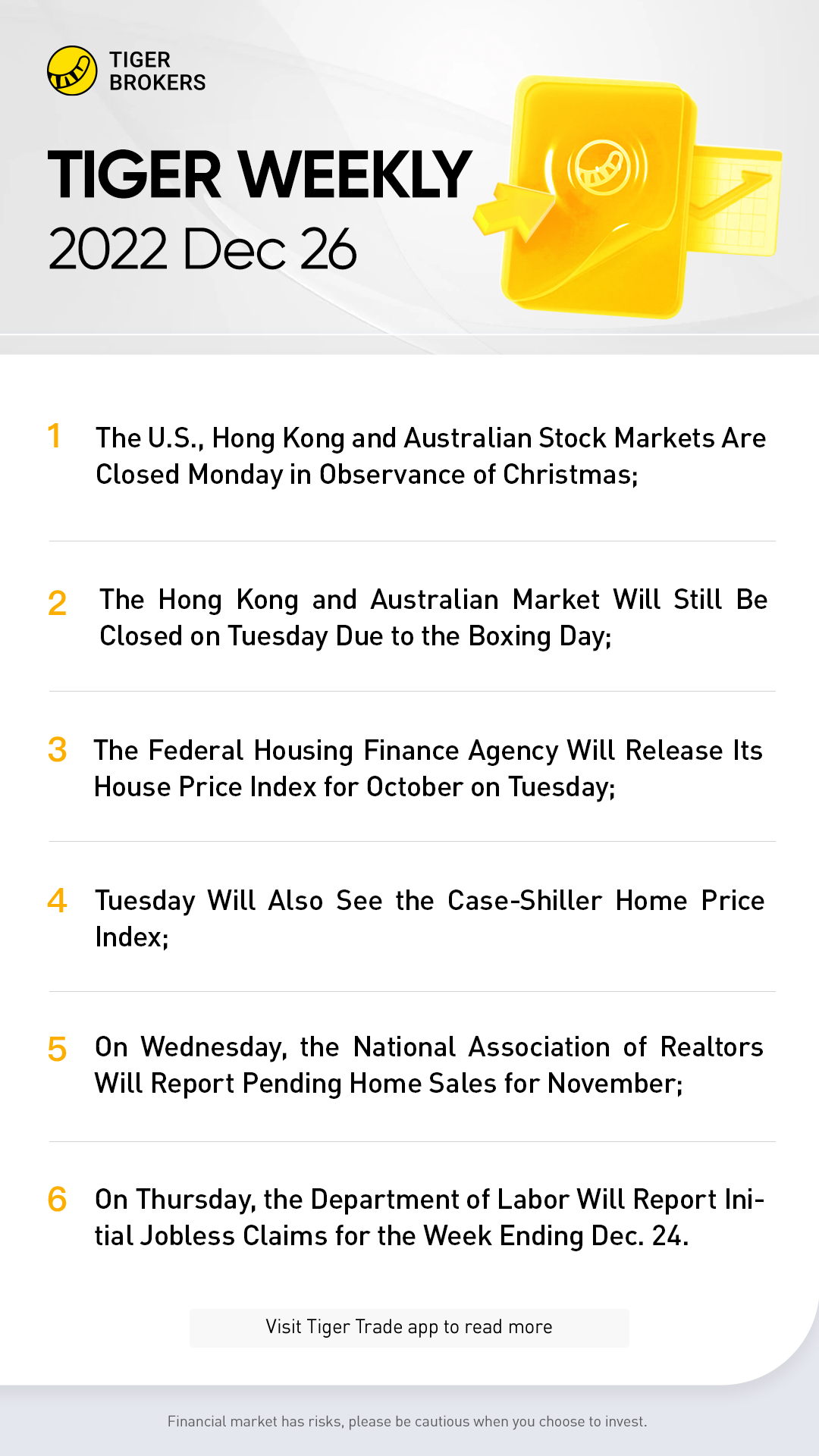Stock and bond markets will be closed on Monday for the Christmas holiday.
It will be a quiet holiday week once Wall Street reopens. It's the stretch between Christmas and New Years, and the corporate calendar is practically empty. There are no major companies reporting earnings or speaking with investors. Fourth-quarter earnings season kicks off with results from several big banks on Jan. 13.
There are a few economic-data releases to watch this week. On Tuesday, S&P CoreLogic releases its Case-Shiller National Home Price Index for October and the Federal Housing Finance Agency releases its House Price Index for October.
On Wednesday, the National Association of Realtors reports pending home sales for November. Finally, on Thursday, the Department of Labor reports initial jobless claims for the week ending Dec. 24. Claims have averaged 220,000 in December, about the same level as the two previous months.
Monday 12/26
Equity and fixed-income markets are closed in observance of the Christmas holiday.
Tuesday 12/27
The Federal Housing Finance Agency releases its House Price Index for October. Consensus estimate is for 0.7% a month-over-month decline, following a 0.1% gain in September.
S&P CoreLogic releases its Case-Shiller National Home Price Index for October. Consensus estimate is for a 8.2% year-over-year increase, following a 10.6% gain in September.
Home-price growth peaked in March 2022 at a record 20.8% and has decelerated since then amid rising mortgage rates and a subsequent chill in home-sales activity.
Referring to the September report, Craig J. Lazzara, managing director at S&P Dow Jones Indices, said, "As has been the case for the past several months, our report reflects short-term declines and medium-term deceleration in housing prices across the U.S."
The Southeast (+20.8%) and South (+19.9%) were the strongest regions by far, with gains more than double those of the Northeast, Midwest, and West.
The Federal Reserve Bank of Dallas releases its Texas Manufacturing Outlook Survey for December. Economists forecast a negative 10.5 reading, about four points better than in November. The index has had seven consecutive monthly readings of less than zero, indicating a slumping manufacturing sector in the region.
Wednesday 12/28
The National Association of Realtors reports pending home sales for November. Expectations are for sales to decline 3.8% month over month, after falling 4.6% in October.
Pending home sales have declined five straight months, and 11 out of the past 12. The housing slump is particularly bad in the West region of the U.S., according to NAR chief economist Lawrence Yun, due to a combination of high interest rates and expensive home prices.
The Federal Reserve Bank of Richmond releases its Fifth District Survey of Manufacturing Activity for December. The consensus call is for a negative 8.5 reading, roughly even with the previous month's data.
All five of the regional Federal Reserve Bank manufacturing indexes -- Dallas, Kansas City, New York, Philadelphia, and Richmond, Va. -- are showing contraction in the regions' manufacturing sectors.
Thursday 12/29
The Department of Labor reports initial jobless claims for the week ending Dec. 24. Claims have averaged 220,000 in December, about the same level as the two previous months. While that's more than the half-century lows reached in March, it's still less than historical averages. This suggests that the labor market is still tight and Federal Reserve's interest-rate hikes haven't yet dented employment and wage growth as much as the FOMC would like.
Friday 12/30
The Institute for Supply Management releases its Chicago Business Barometer for December. Economists forecast a 43 reading, about six points better than the prior month. Excluding the 2020 pandemic shock, November's 37.2 reading was the lowest reading since the 2008-09 financial crisis.

